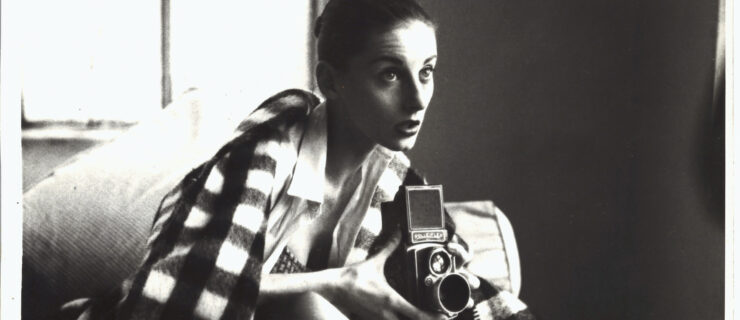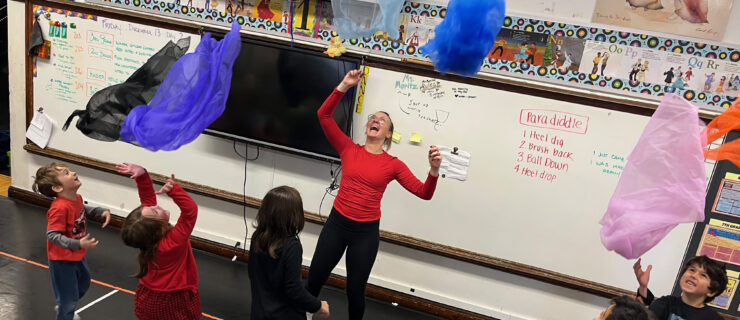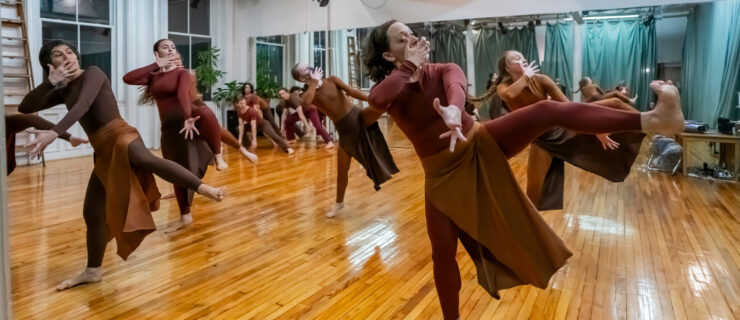Siblings Sharing the Stage
Kaitlyn & Raina Gilliland
In Suki Schorer’s advanced class at the School of American Ballet, it’s easy to spot Kaitlyn and Raina Gilliland. “We gravitate to each other,” Raina says, as her sister nods knowingly. “It’s a tall thing, I guess!”
While it’s true that the sisters are physically a head above the others in class (Kaitlyn is 5’10” and Raina is 5′ 11″), there’s an air of intrigue about both girls that makes them transfixing onstage. Both are classic balletic beauties—leggy, with noble, elegant bearing—and wonderfully exacting in technique and musicality. Kaitlyn, 20, just completed her first year in the corps of New York City Ballet (it’s not unusual for company members to take class at the company-affiliated SAB) but she’s already prompted star-in-the-making talk with her haunting solo turn in Eliot Feld’s Etoile Polaire last year. In this year’s SAB Workshop performances, Raina, 17, proved an equally compelling dancer, and was commanding in the Choleric variation of The Four Temperaments.
For both girls, life without ballet is barely a memory. “I can’t even remember that far back,” Raina says. “I’d be in the dressing room with my sister and all her friends, and I thought it was so cool.”
“A lot of it was Raina and I running around,” Kaitlyn recalls. “I used to go in and take my mom’s advanced class when I was like, 3 years old! I’d just stand at the barre in my little pink corduroys, doing my own thing.” Ballet was a family affair: Their mother, Lise Houlton, danced with American Ballet Theatre and now directs Minnesota Dance Theatre, which their grandmother, Loyce Houlton, founded. “The studio was home away from home for us,” Raina says.
Even outside the studio, the two were inseparable. “Best friends,” Raina says.
“I was always the angel; Raina was a troublemaker—a little bit,” Kaitlyn adds, smiling. They remember dancing to Swan Lake in the living room, Kaitlyn inevitably in the prettier tiara. Cue the “big, loud evil music,” and Raina, wearing a witch hat, would leap for a moment into the spotlight, before her sister waved her off. “It’s OK,” Raina laughs. “I had my time later!”
By the time Kaitlyn was ready to leave for SAB, Raina had moved into Kaitlyn’s technique level. She soon followed her sister to New York. Though the girls say they’ve never been competitive, they watch each other intently during class. Kaitlyn admits she loves giving pointers to Raina, who has trouble doing the same for her older sister (“maybe after I prod her for 20 minutes,” Kaitlyn says). Raina, for her part, admires Kaitlyn’s work ethic. “She does every combination twice,” she says. “She works so hard, and it really shows.”
Kaitlyn is just as admiring of her sister. “Raina’s very striking, and she sticks out in a good way,” she says. “It’s inspiring to see. You have to realize, you’re dancing because you love it—and you see that in Raina’s dancing all the time.”
Though the girls have busy schedules—Raina is a senior at the Professional Children’s School and Kaitlyn’s been rehearsing Nutcracker—they still make time to hang out. It’s clear that the rapport they had years ago when they would raid their mom’s costume chest is alive and well. “We go shopping, but we have different shopping tolerance,” Kaitlyn says. “She gets so annoyed with me!”
“She moseys a lot,” Raina teases. They playfully argue for a good few minutes over who’s smarter—Kaitlyn bets her sister will win every academic award at PCS while Raina mentions Kaitlyn was a National Merit Scholar—before admitting mutual defeat. “It’s the whole angel/devil thing again,” Raina sighs. “We have a good time.” —Rebecca Milzoff
David & Maia Makhateli
“It’s quite hard to be Juliet when Romeo is your brother,” confessed Maia Makhateli. “Especially when you know each other so well,” laughed her brother David. But they didn’t need to worry as the Japanese audiences loved their performances together at the World International Ballet Festival in Tokyo last year anyway.
The two Makhatelis have come a long way from their birth place in Tbilisi, Georgia, formerly part of the Soviet Union. Today Maia, 21, is a “grand sujet” at Dutch National Ballet in Amsterdam while David, 32, has been promoted to principal at The Royal Ballet in London. They are good friends and talk regularly to each other. Both were taught by their father, Nikoloz Makhateli, a former principal with the State Ballet of Georgia, then teacher at the Tbilisi State Choreographic School. Their mother, Marina Loladze, also danced in the company; their grandfather had been a folk dancer.
David started at the ballet school in 1985 and was taught by the famous Georgian danseur noble, Vakhtang Chabukiani. When the Soviet Union collapsed, civil war broke out in Georgia and daily living grew challenging with food shortages and no heating, electricity, or water. David tells of having to dodge bullets in order to get to class. But he escaped the worst of it when he won the Espoir prize at the Prix de Lausanne in 1992 and a scholarship to The Royal Ballet Upper School. On graduating, he joined Birmingham Royal Ballet, then Dutch National Ballet. In 1996, he went to Houston Ballet, reaching principal status, and in 2003 he joined The Royal Ballet.
At the age of 23, David was invited by the Bolshoi’s prima ballerina and fellow Georgian Nina Ananiashvili (see “Georgia on Her Mind,” June) to dance Albrecht to her Giselle in their nation’s capital. Press coverage and public interest was tremendous for the return of these home-grown stars, especially when the siblings finally met up again. Nine-year-old Maia joined Nina and David in daily class, showing off her high extension and balance.
Both Makhatelis epitomize the Russian classical style and have a determination to achieve. David has a light, soaring jump, an elegant line, and a regal air. He shows an intensity both in his dancing and in characterizations, whereas Maia is spontaneous and vivacious. She offers lovely open épaulement, neat footwork, and good jumps. The two are masters of multiple pirouettes and bravura split jetés.
“Maia has her own personality,” says David. “Like all young dancers, she has no fear and is out to prove ‘I’m the best,’ whereas now I have a different responsibility. I have to think how to do a role as artistically and as cleanly as possible. When we’ve danced together, because she’s so much younger and I have experience, I’ll tell her how to do certain things—and she takes it!”
When Maia was 15, Nikoloz was offered work at the Sun Valley Ballet School in Idaho, and the family packed their bags for the U.S. There David, as a guest artist, and Maia danced together for the first time in the school’s Nutcracker. Later the family moved to Denver, where both parents founded the Makhateli Ballet Academy in 2005.
Three years ago Maia joined Colorado Ballet and danced many principal roles. When she made her debut as Aurora, David raced over to see her. “It was horrible watching my sister on stage,” he says—then qualifies his statement with, “It was the first time I’d seen her dance professionally and I was so nervous for her. But she was great.” When visiting her brother last year, Maia was invited to join Birmingham Royal Ballet, where she danced for a year. This summer, after attending David’s wedding to Natalia Kremen (who dances with English National Ballet) in London in March, Maia moved to Dutch National Ballet. She had visited David there and remembered the company fondly. This season she is scheduled to dance Aurora and Rudi van Dantzig’s Juliet—though this time without her brother as Romeo. —Margaret Willis
Edwin & Roberto Olvera
Two brothers from Wisconsin—Edwin and Roberto Olvera. Two dance companies in Connecticut—Pilobolus and MOMIX. The companies are fraternal twins. The brothers, identical.
They didn’t always know they would become dancers. But growing up, “We were mischievous movers,” says Edwin. “We would see what we could do, what we could climb on.” In high school they played football, ran track, and trained in light-weight body building. They joined the military together under an eight-year contract, six serving, two on reserve. After they had served their time, they went to college and got into dance more seriously. “We were having this duel,” Edwin says. “Dancers inside and soldiers outside.”
They agree that dancing has been their best job so far, but past jobs have run the gamut from bus boys to telemarketers to performing in nightclubs. “We used to strip together. Tito and Eddy: Double Trouble.” They laugh about it now. “We never took it seriously,” says Roberto. “I saw it as a half-hour comedy hour.”
They attended the University of Wisconsin-Milwaukee Peck School of the Arts and started dancing with capoeira classes. Transitioning from body building to dance was difficult. “We still had this physique, and for certain dance moves, like a dégagé,” says Edwin, “we were using opposite muscles. We were always gripping and it was painful.”
Their teacher, Long Zhao, created a solo for them called Zoom Out, which was chosen to represent the region at the American College Dance Festival at the Kennedy Center in Washington, DC, in 2004. He also urged them to audition for companies like Pilobolus and Cirque du Soleil. Following his advice, they auditioned for Pilobolus three times. The third time was a charm for Edwin, who got the job on their 25th birthday.
Roberto moved to L.A. to work in music videos, and for the first time he did not live with his brother. “It was the most miserable time I’ve spent,” he says. “Everyone’s trying to be somebody out there. I found myself working, not dancing.” Within a few months, he landed a gig as a member of MOMIX’s touring company and headed back east.
Even though the brothers work in different companies, they live three minutes from each other and take any opportunity to clown around together. They toss themselves at each other, balancing weight and making shapes, and they reminisce to friends about growing up together (“Our mother would yell at us with one name, ‘Edwinroberto!’”).
Edwin has shown up at MOMIX rehearsals and talked to artistic director Moses Pendleton, tricking him into believing he is Roberto. At Pilobolus, Roberto fills in when the company needs more bodies to create their shapes, like in the recent Hyundai commercial or The Oprah Winfrey Show.
As far as sibling rivalry for these two, it doesn’t exist. “I don’t think we’re envious of each other because for the most part we’re doing the exact same thing,” says Roberto. Except for one major difference: Edwin is “happily married,” and Roberto is “happily single.”
The Puerto Rican/Mexican twins are 27, and they have two older brothers and one younger sister. Their father, a billboard sign painter, lives in Chicago, and their mother in Green Bay, Wisconsin.
Watching Edwin perform is a humbling experience for Roberto. “If that’s how he looks onstage, I can imagine what I look like,” he says. In Rushes, a new Pilobolus work created by Robby Barnett with Israeli choreographers Inbal Pinto and Avshalom Pollak, Edwin says of his odd, quirky character, “I took inspiration from our father. He is a caring, giving, emotional person.”
Roberto says, “When I saw him at the Joyce in Rushes, it made me think of my past. I thought, ‘That’s us, our life, our past.’ I hope one day my brother and I can dance together.” —Emily Macel
Daniel & Roland Sarabia
Rolando and Daniel Sarabia are finally doing what they left Cuba to do—dance the work of new choreographers and the classics.
Better yet, they are doing it together at Miami City Ballet, where Rolando, 25, is a principal and Daniel, 22, a soloist. “We have the best of both worlds here,” says Rolando, who was dancing lead roles at Ballet Nacional de Cuba when he left in 2003 (see “Transitions,” Nov. 06).
The brothers grew up in the wings at the Ballet Nacional de Cuba. Their father, also a dancer, brought them to class and rehearsal. “Our father was our first influence and our inspiration,” says Daniel. “Ballet was in our blood.”
Because of their age difference they were never in the same classes during their training years. Both eagerly expound on each other’s gifts. “Daniel is a natural actor,” says Rolando. “I don’t know how he does it.” Daniel boasts of his brother’s bravura in turning and jumping. “He claims to have started spinning in our mother’s womb,” he teases.
Daniel defected first through Mexico in 2002, telling only his mother of his plans. He spent two years at Boston Ballet dancing both classical and contemporary work. It was a bittersweet time for his older brother. “It was like a piece of my heart was missing,” says Rolando.
Rolando followed his brother’s lead, defecting in 2005. After one season at Houston Ballet, spent mostly sidelined with a knee injury, Rolando has found at MCB what he was looking for—a chance to dance new work and be back with his brother. He also enjoys a one-on-one working relationship with artistic director Edward Villella.
Right now the brothers feel in their element among the Cuban community in Miami, which includes several family members. And they welcome the challenges ahead with the new work. In discussing what he will be dancing next, Rolando peppers his conversation with “hard” and “different.” He points out that the Cuban training is purely classical and they had little experience with contemporary ballets. “But it’s great to be doing work by such important choreographers,” he says. “That’s why we came here.” This season they are both rehearsing Twyla Tharp’s Sinatra Suite and Balanchine’s Jewels. Daniel had a taste of Balanchine during his time with Boston Ballet, but it’s all fresh for Rolando.
The brothers share an apartment, the cooking, a car (currently not working), and a dance life. “We are like a couple,” jokes Rolando. “We do everything together.” Their ultimate goal is to be able to come and go from Cuba, their homeland. “We love our country,” says Rolando. “We are here because of our profession.” The Sarabias communicate with their parents weekly but are currently not allowed back in the country. Nor can their parents visit the U.S. When asked about the political situation in Cuba, Rolando says, “It could change tomorrow or stay the same for the next 10 years.” —Nancy Wozny




